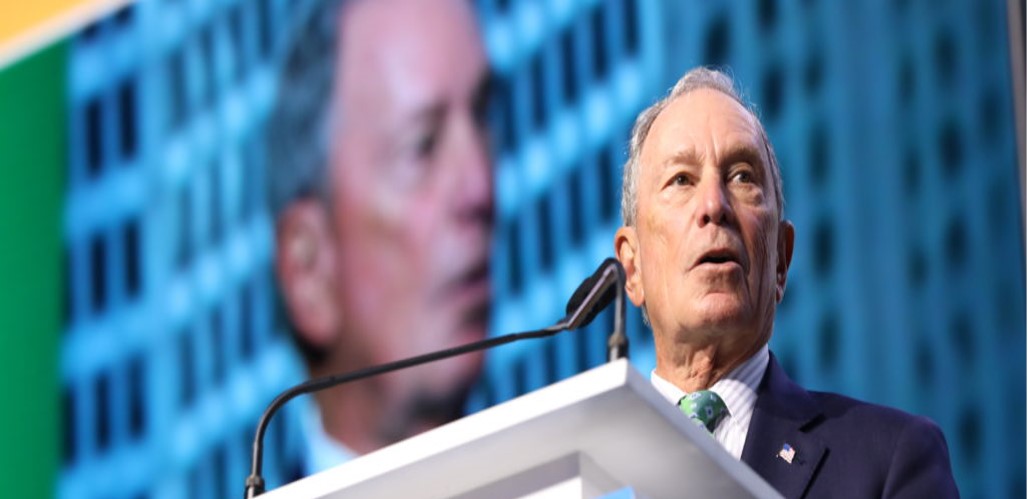Ecopolicy and collective action, not personal ecopiety, are the way forward on climate change.

Billionaire entrepreneur and former New York City Mayor Michael Bloomberg has ruffled his fair share of feathers with his late entry into the Presidential race. Pundits debate whether this move is helpful by hitting President Trump hard with record-setting aggressive ad buys in six key states or is counterproductive, actually impairing the chances of a Democratic win next November.
Mr. Bloomberg’s credentials as a climate change activist complicate the situation further. In a climate of gridlock and federal inaction, Bloomberg has arguably achieved more than Congress has in fighting climate change. In 2011, he partnered with the Sierra Club to close more than a third of U.S. coal plants. True, some of those plants reopened as natural gas-fired plants, which are cleaner but still obviously emit climate change-exacerbating carbon. Bloomberg has since doubled down, committing 500 million dollars to the “Beyond Carbon” initiative which goes even further.

This new initiative, also partnered with the Sierra Club, sets its sights on retiring all of the remaining coal plants in the U.S. by 2030 ―working to prevent the gas industry from replacing those plants, while supporting renewable energy ventures to fill the gap. Achieving these outcomes would translate into real, measurable, significant reductions in carbon production.
What’s more, in conjunction with veteran environmentalist and former Sierra Club Executive Director Carl Pope, Bloomberg has produced an accessible guide, Climate of Hope: How Cities, Businesses and Citizens Can Save the Planet. This book provides a blueprint for moving ahead with climate change-fighting initiatives at local and state levels that, by necessity, bypass the inaction in Washington.

Is national leadership desperately needed that prioritizes climate change? Bloomberg and Pope emphatically answer “Yes!” But instead of waiting around for that, they have gotten busy. Climate of Hope provides a “how-to” manual for everyone from local planning boards, to city mayors, to state governors, of ways to move ahead on climate change both legislatively and strategically with the kind of scope and efficacy that makes a real difference in terms of decarbonization.
These are also the kinds of strategies featured in the 2018 Bloomberg/National Geographic/Radical Media co-produced documentary From Paris to Pittsburgh. As with Bloomberg and Pope’s new book, the emphasis in this film is on ground-up policy solutions and ways that municipalities, businesses, and private citizens can be most efficaciously engaged in climate action, with or without Congress and the White House taking action. Much time is dedicated in both works to the importance of electing passionately committed climate advocates to public office from the ground up.

With that background in mind, what do we make of a much-reported challenge to Bloomberg’s environmentalism that is now being revisited since his official entrance into the race? Earlier this year, a college student publicly called out Bloomberg, stating, “I am personally a big environmental person. You are very big on changing the big aspects, but personally, are you a vegan?” The student followed this by asking if Bloomberg drives “an environmentally friendly car” ―an entity that arguably does not exist since no car (hybrid, fully electric, or otherwise) is actually “environmentally friendly.” It is after all still a car.
But “the personally vegan” question highlighted an all-too-common dynamic that pervades contemporary environmental discourses. We are all inundated with media messaging that reassures us that individual lifestyle choices, like “personally becoming vegan,” have far more impact than larger broad-based programmatic measures – oh, like closing down ALL the remaining coal plants in the U.S. by 2030. Or, working with mayors across the country to enact local carbon-reduction measures and climate adaptation measures on a public policy level. Or, working to elect and seat a critical mass of climate-defending public officeholders at every level of government.
Instead, exaltations of personal “ecopiety” rule the day. Performing individual daily acts of lifestyle environmental virtue is strategically marketed to Americans as a viable solution to climate change. Eat vegan, recycle plastic (less than 9% of which ever gets recycled), bring your canvas bags to the supermarket, drive a hybrid vehicle, and all will be well! What’s more, even though a mere 100 companies across the globe are responsible for 71% of all carbon emissions, most of the media messages we receive repeatedly portray climate change as the individual consumer’s responsibility. Instead of holding these 100 companies accountable, “consumers” (not “citizens”) can solve climate change, these messages tell us, by simply buying and consuming the “right” stuff, like vegan meals.
Bloomberg misinterpreted the student’s vegan question as casting doubt on his level of health and fitness to run for president, which precipitated a somewhat rambling response about how he works out, is more careful now about what he eats, although does have the occasional steak. As the second part of the student’s question was harder to hear, it is likely that Mr. Bloomberg, in what was a crowded room, only took in the first part of the question about his eating habits and was not making the connection between his personal vegan status (or lack thereof) and significant environmental impact.
As someone who is famously data-driven (Bloomberg’s humorous slogan is “In God we trust. Everyone else bring data”), Bloomberg would also likely not “track” with the student’s logic that what he eats is far more important in terms of climate impact than the broad-reaching effects of his decarbonization and climate adaptation programs. Bloomberg knows that, in terms of speed, scope, and scale, what moves the needle on carbon reduction is not what he personally did or did not eat for lunch, but collective actions like how many coal plants he and his “Beyond Carbon” collaborators can shut down and replace with renewables, and how fast they can do it.
Notice the premise, though, of the college student’s question that casually dismisses “changing big aspects” of environmental problems as being seemingly irrelevant. This sharply contrasts with far more concern placed on identity politics of “personally being vegan” as a part of individual, voluntary, privatized eco-pious practice. I empathize with this caring and sincere student. I have been this student at one time or another. Her priorities have been shaped by aggressive corporate marketing, too often then perpetuated by well-meaning environmental messaging, that conveniently places the burden of climate change on individual consumers. This reinforces the delusion that our personal “eco-pious” consumption choices, not broader-ranging programmatic, structural, and public policy measures, are what will truly “make a difference” in staving off, or at least mitigating, climate chaos.
Nearly every single major environmental advocate decries the prioritizing of personal ecopiety as a misleading narrative in environmental messaging and communication. In fact, in a 2019 interview of sixteen of the world’s most prominent sustainability leaders and environmental thinkers, fourteen of the sixteen specifically cited collective action and organizing as the most effective strategy for addressing global climate change. Bill McKibben emphatically states, “You cannot do it [address climate change] anymore one lightbulb, one vegan dinner at a time.” In the same survey, Paul Hawken likewise redirects and emphasizes that “[i]t is not about what ‘I’ can do. It is about what we can do.” And even Barak Obama when he thought his microphone was off, following a campaign event, told journalist Brian Williams, “Well the truth is, Brian, we can’t solve global warming because I f**king changed the lightbulbs in my house. It’s because of something collective.”
Broader-scaled changes make more significant impacts, and small changes, though worthy for their own sake, do not “move the needle,” or do so fast enough, for what we need. This is the premise of Gernot Wagner’s book, But Will the Planet Notice?: How Smart Economics Can Save the World. “Every little bit doesn’t always help,” declares Wagner, former lead senior economist at the Environmental Defense Fund and current Professor of Environment and Public Studies at New York University. In his essay “Going Green but Getting Nowhere,” Wagner, who has advanced degrees in political economy and government from Harvard University and in economics from Stanford University, instructs, “The changes needed are so large and profound that they are beyond the reach of environmental individual action.” He has confessed, on his Amazon.com author’s page bio, that he does not eat meat, does not drive, and “knows full well the futility of his choices.” It is changes in our collective way of life at a national and international scale, major structural changes, Wagner maintains, that will make enough of a difference that the “planet will actually notice.” What is more, although virtuous and commendable, he warns that the practice of individual small pious actions can “distract us from the need for collective action, and it does not add up to enough.”
Although Wagner and environmental author and Rutgers University Media Studies Professor Naomi Klein differ ideologically in various approaches to climate change, they do agree on this point. Klein’s most recent book, On Fire: The (Burning) Case for a Green New Deal, includes a chapter called “Stop Trying to Save the World All by Yourself” that advocates refocusing the bulk of our efforts on collective action rather than the tiny lifestyle changes too often championed as the way to “save the earth.”
I draw upon both Wagner’s and Klein’s insights in my own new book, Ecopiety: Green Media and the Dilemma of Environmental Virtue. I also go one step further. Ecopiety argues that the savvy and enormously successful marketing of personal “ecopiety” as a climate solution in and through mediated popular culture is counterproductive in the worst possible ways. It both placates and pacifies us while functionally exhausting us, conveniently keeping us so preoccupied fussing about correctly performing ritualistic eco-pious lifestyle choices, all while the world burns. While we are busy fretting about which toilet paper to buy and dutifully sorting and recycling our plastic containers ―again, 91% of which will never be recycled ― the climate clock ticks.

One may not like Mr. Bloomberg and his last-minute candidacy for a whole host of reasons, one of which might be billionaire and plutocrat fatigue. So be it. But skewering the guy who is spearheading a major U.S. decarbonization action, because he is guilty of not being “personally vegan,” woefully misses the mark. There are legitimate criticisms to make of Bloomberg. For one, as recently as 2015, he defended the practice of hydraulic fracking for gas before becoming better educated about the climate consequences. There are certainly other legitimate objections one can make to a Bloomberg candidacy on various levels, but this “personally vegan” issue should not be one of them.

And what of “changing the big aspects,” as the college student put it? Yes, please let’s do focus on “changing the big aspects” that the planet will register and, as Gernot Wagner says, “actually notice.” If you are vegan, drive a hybrid, dutifully recycle, and buy the right toilet paper, that is awesome. Thank you. Like Wagner, I support a “both/and” micro/macro approach. But let’s not convince ourselves that these individualized acts of ecopiety are adequate to the task, much less celebrate them as being more important than “changing the big aspects.” To say that we are in a time-sensitive situation is an understatement of epic proportions.
We need massive public investment, massive structural changes, smarter public policy, including and especially smarter economic policy, collective action, and rapid implementation of both decarbonization and adaptation measures. And we needed to have made tracks on all of this decades ago, but we are where we are. As the adage goes, “The best time to plant a tree was 20 years ago. The next best time is today.”
To do this, though, we need to let go of the disproportionate obsession with personal ecopiety. Let’s free up that energy to focus on working together to enact broader measures that have a deeper and wider impact. Let’s find creative “work-arounds” anywhere we can when those measures run into obstacles. This is the way to move forward into a more sustainable future.

